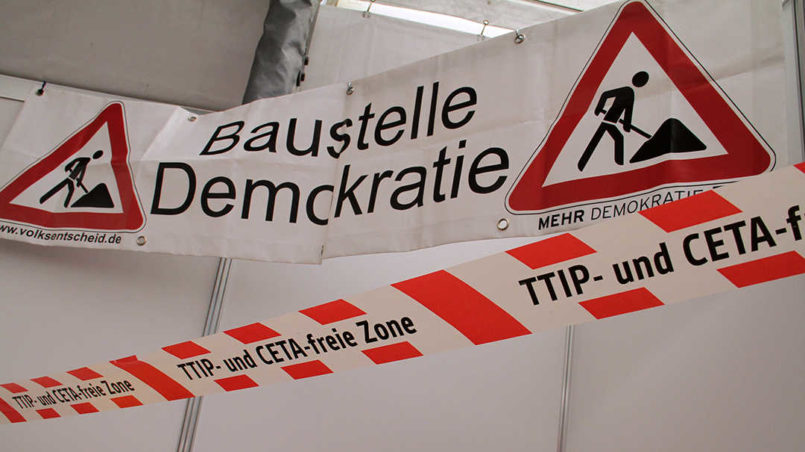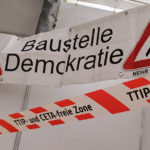Review: Democracy in Europe by Luciano Canfora

I recently delved into a book, entitled, “Democracy in Europe”. In this book, the Italian classicist, Luciano Canfora, goes on an interdisciplinary excursion. Let’s go!
With an excursion through the past 1,000 years and the presentation of various causes, the author points out the apparent failure of democracy. On the one hand, there are intrinsic tendencies, for example the confusing relationship of democracy to Bonapartism and fascism or the fatal alliance in the 5th century BC between proletarians and capitalists with the goal of operating an imperialistic foreign policy of Athens.
On the other hand, there were also the external attacks: due to restrictions of voters’ rights in the 200 years after the French Revolution, the paradigm that the wishes of the people have to be articulated slowly transformed into a fata morgana for the gullible. After the liberal democracies ultimately triumphed in the 20th century, a financially sound elite, consisting of upper and middle classes, asserted themselves, exercising their freedom increasingly unreservedly.
According to this book, the elected institutions are only decorative ornaments of this minority. Elections have shrivelled into a farce, fundamental matters are decided elsewhere. Today, the general right to vote has almost disappeared. Despite these developments, the west has learned to completely claim the term democracy for itself, while, at the same time, being prepared to do anything to combat communism, including the use of illegal state apparatus.
Canfora addresses the connection between being fit for military service and civil identity in the ancient Greek city states. Only the community of armed male civilians possessed political rights, and, therefore, only a minority could be understood as being free and equal, only they ruled. Hence, the ancient Greek democracy cannot be seen as a regency for the masses, much more the leadership was taken over by a conglomerate of financially beneficiaries, who accepted this system among themselves.
These prosperous people could have, at any given point of time, brought a part of the precariats on their side to win the majority during public meetings. A foundation of the stabilization in this relation between the poor and the rich was formed by the liturgies. If the wealthy were willing to care for the poor, eligible voters, they were allowed to stay rich. But the relationships between the classes of the ancient Greek was never without conflict or instability.
In Canfora’s statements there is a radical fracture in two respects. On the one hand, temporal: after he, very briefly, dealt with the revolution in England and the founding of the USA, he turned towards the French Revolution. This leap over two thousand years is regrettable. Was there nothing during that whole time that could today be considered democratic? No confrontation in the Roman Republic which could have interested Canfora as an ancient historian?
This also means a break for the approach.
This change of perspective can be justified as regards contents. In 1749, the Jacobin-dominated French National Convention abolished slavery, which was never of interest for the liberal Anglo-Saxon revolutionaries. Napoleon, as an exponent of the bourgeoisie, reversed this decision. The right to vote in the 19th century had an illusionistic effect to the extent that almost everywhere the majority of inhabitants were excluded by gender and possession.
Canfora gives the defeat of democratic powers at the beginning of the First World War extensive consideration. In Germany in 1918, the attempt to draw consequences from this, failed; the majority SPD crushed the revolutionary attempts in an alliance with liberal and proto-fascism powers. The Russian socialists who, due to the rougher tsaristic rule did not know the temptation of parliamentary participation, were better prepared. They successfully effected a revolution, which, contrary to the common totalitarian view, for Canfora remained an orientation point of democratic powers, where Stalin and his successors committed significant mistakes.
The western Soviet alliance from 1941 onwards, as well as the political new beginning in some European countries in 1945, especially in Italy and France, appears to Canfora to be an opportunity for the better. It is also clear how democratic approaches were pushed back again. Overall, Canfora sees Europe to be on a path towards a mixed system:
On the one hand, there still is parliamentarianism, whereby parts of the population have been denied a representative due to the design of the right to vote – the most obvious is due to a majority voting system, but also a proportional representation system, for example in Germany, due to the five percent clause. Additionally, regulatory competences are increasingly handed over to supranational, liberally-dominated organizations, with all the contracts which, in the meantime, appear as natural and not done by man. On the other hand, there is the power of propaganda of the elite, in particular the owners of TV stations. Here, the direct political influence only plays a minor role, in comparison with the praise of the consumer world.
Overall, I rate this book as very important as one can see from which influences our current political system is roughly composed. Although I was not always thrilled by the author’s perspective, the classicist presented solid expertise in a meaningful manner and taught me something new about our political culture. To constructively change something, we first have to determine what has not worked until now, and here the story can teach us valuable lessons.
Translation German – English: Anna Stockenhuber
Credits
| Image | Title | Author | License |
|---|---|---|---|
 |
Democracy Under Construction | Edda Dietrich | CC BY-SA 2.0 |
